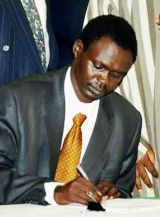Darfur peace is dangerous – Minawi
June 6, 2006 (FATA BORNO CAMP, Darfur) — Signing a peace deal to end three years of fighting that some have called genocide would normally propel a rebel leader into the ranks of national hero.
 But in Sudan’s violent Darfur region, the man who made peace with the government in Nigeria on May 5 is restricted in his movement because of security concerns and reviled as a traitor by many in teeming refugee camps.
But in Sudan’s violent Darfur region, the man who made peace with the government in Nigeria on May 5 is restricted in his movement because of security concerns and reviled as a traitor by many in teeming refugee camps.
Last week, on Minni Arcua Minnawi’s first return to Darfur since signing the Abuja peace deal, he wanted to visit Abou Shouk camp near the main town of el-Fasher. But the African Union said he was unable to out of fears for his safety following daily protests against the agreement.
At nearby Fata Borno Camp residents warned him to stay away from their camp as well.
“If Minni comes here we will slaughter him,” said Abdallah Adam Ibrahim, who fled his home to the camp in north Darfur three years ago.
“He has sold our souls and our tears — he is a traitor,” he said, running his finger across his throat to mime slitting the throat of the young SLA leader.
Minnawi, head of the main faction of the Sudan Liberation Army (SLA), signed the agreement with the Sudanese government to end the fighting that has killed tens of thousands of people and driven more than 2.5 million from their homes to miserable camps in the vast desert region.
The United States says the campaign of rape, killing and looting carried out by Arab militia known locally as Janjaweed and originally armed by the government is genocide, a charge the government denies. The International Criminal Court is investigating alleged war crimes in the region.
Despite intense international pressure and the threat of sanctions, rival SLA leader Abdel Wahed Mohammed al-Nur and the rebel Justice and Equality Movement (JEM) refused to sign the Abuja deal.
They said they wanted more compensation for war victims, more political posts and a role in disarming the Janjaweed.
Though neither group has as much firepower on the ground as Minnawi, Nur is from the region’s main tribe — the Fur — who also make up the majority of those languishing in squalid camps.
“Minni may have the soldiers but all the camps belong to Abdel Wahed,” said Ibrahim Ismail Adam, another Darfuri who has taken refuge in the Fata Borno camp.
Nur’s objections to the African Union-mediated peace deal are echoed by thousands of Darfuris demonstrating almost daily in Khartoum and in the camps.
“We have paid a dear price in this war, we have suffered rape, pillage and killing, so we have to have compensation,” said Mohamed Abdel Karim, a local Fur leader from the areas around Fata Borno.
The Abuja deal allocates an initial $30 million in compensation from the government for more than 3 million Darfuris the United Nations says were affected by the conflict.
Nur and those in the camps dismissed the $10 per person payout as a joke.
Minnawi says some international partners have promised to add to that amount. But his many critics in the camps aren’t hearing his message.
Minnawi is unable to travel to areas controlled by commanders loyal to Nur and also says he still does not fully trust his government partners in peace.
“If I trust the government 100 percent I would not come to land in the AU camp,” he told Reuters in an interview in the AU headquarters in el-Fasher.
This week he refused to allow an AU plane moving him from south Sudan to el-Fasher to stop and refuel in Nyala in South Darfur for security reasons.
The AU peace agreement reached in early May was the result of two years of talks. Analysts say the road ahead on the ground in Darfur will likely be as long and difficult. Despite the setbacks during his first weeks as peacemaker, Minnawi remained optimistic.
“With time … everyone will recognize that the peace is for them, the peace is for the Darfuri people,” he said.
(Reuters)
